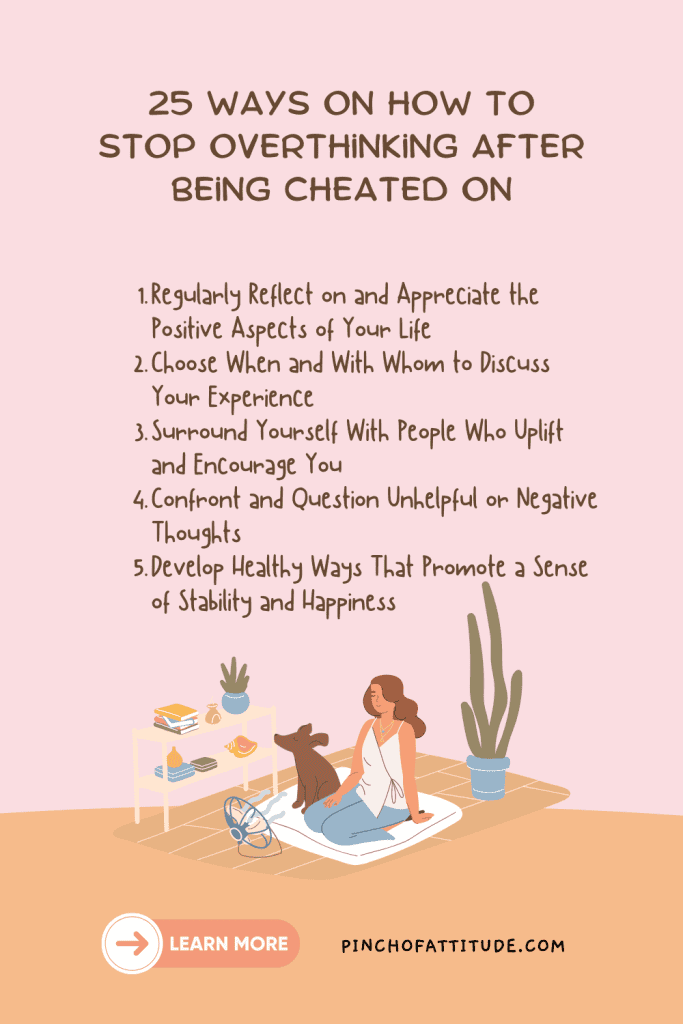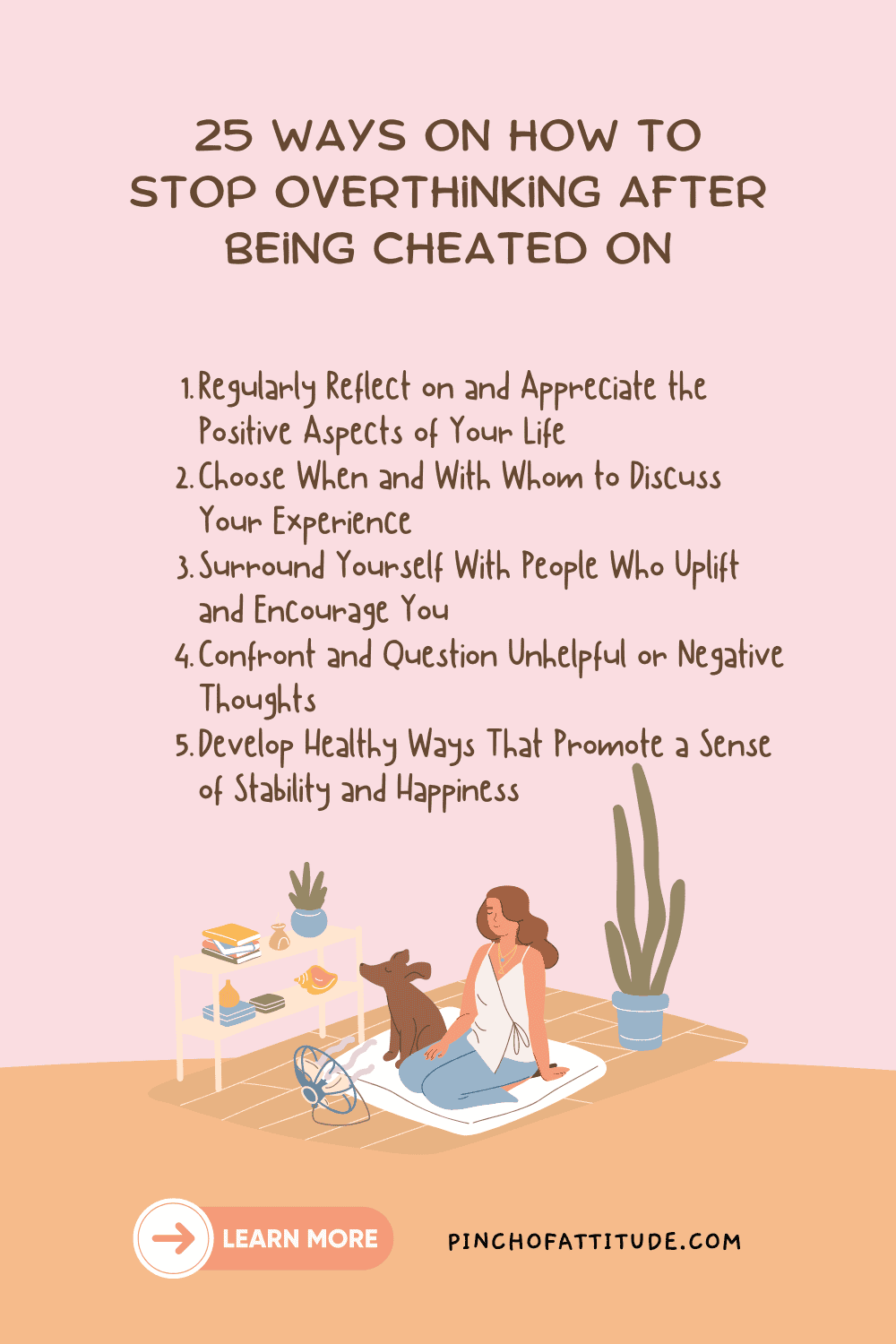Have you ever had your world collapse after finding out your partner cheated? Yep, been there, done that.
I was 27, rocking life with confidence until my partner cheated and rewrote the script.
The trust I had, not just in him, but in everyone, shattered. It even affected my amazing relationship with my now-husband!
Thankfully, he was a rock, and through it all, I learned a very important lesson: I wasn’t the problem.
If you’re wondering how to stop overthinking after being cheated on, I’ve got your back.
You deserve to move forward, and hopefully, the things I learned from my own healing journey can help you get there.
- You deserve to heal and move forward in a healthy way. Don’t rush the process, and be gentle with yourself throughout.
- Focus on the present moment through practices like mindfulness and deep breathing. You can also find healthy outlets for your emotions, like exercise or journaling.
- The long-term effects of infidelity can be significant, but they are not insurmountable. Seek professional help if needed.
Table of Contents
25 Ways on How to Stop Overthinking After Being Cheated On

When you get cheated on by someone you love, it throws your entire world off-kilter.
Sure, it’s natural to feel that way, but the overthinking that comes after can drive anyone nuts. It can be utterly debilitating, to say the least.
Fortunately, I learned that you don’t have to stay stuck in that cycle. I reminded myself that I deserved to heal and move forward, and I did.
How did I do it? Here are 25 practical tips that helped me learn how to stop overthinking and finally leave the past behind:
1. Embrace and Acknowledge the Range of Emotions You’re Experiencing
Someone you trusted with your heart chose to betray you, so it’s understandable to feel a confusing mix of anger, sadness, and maybe even self-doubt.
But don’t try to bottle them up. Pushing them down won’t make them disappear. Instead, acknowledge each feeling, and let yourself feel it fully.
In my experience, the sooner you embrace and acknowledge whatever you feel, the sooner you can begin to move forward.
2. Resist the Urge to Check up on Your Ex-Partner’s Activities Online
I spent way too much time obsessing over the person who cheated on me. I wanted to know what he was up to, who he was with, and if he was happy.
But my good friend told me that I wouldn’t find closure or healing by stalking his social media. So, I unfollowed, blocked, and even took a social media break.
You see, the less you know about your ex-partner’s life, the easier it’ll be to know how to stop fixating on them and start focusing on your well-being.
3. Practice Mindfulness to Stay Grounded in the Present Moment
One effective way to stop overthinking and find peace after being cheated on is to focus on the present.
This is where mindfulness comes in. Because I was grounded in the present moment, it prevented the past from controlling my thoughts and emotions.
I also become aware of my thoughts and feelings, allowing me to let go of the obsessive replay of the situation.
Tip
Try deep breathing exercises, meditation, or simply focusing on your senses to bring yourself back to the present. These practices can break the cycle of overthinking.
4. Focus on Activities That Nurture Your Mental, Emotional, and Physical Health
Neglecting my physical and mental health only led to even more overthinking. So, what I did was prioritize self-care and look for healthy ways to cope with the pain.
I took long walks in nature, got lost in a good book, and enjoyed healthy meals I cooked myself.
These activities offered a much-needed escape and helped put a stop to chronic overthinking.
5. Allocate Specific Times to Process Your Thoughts, Then Shift Focus
I desperately wanted to figure out how to stop thinking about the betrayal. But what I learned was that fighting the thoughts head-on only made them stronger.
So, I started scheduling specific times to process my emotions and revisit the situation.
During these dedicated “thinking periods,” I allowed myself to feel and analyze, but once the time was up, I consciously shifted my focus to something else.
This helped me gradually break the cycle and reclaim control over my thoughts.
6. Use Exercise as a Tool to Release Tension and Improve Your Mood
As an active person who loves sports, I already know the power of exercise. But after the betrayal, it became more than just a hobby. It was a lifeline.
Hitting the gym, going for a run, or even just dancing in my living room helped me release pent-up tension and boost my mood.
The endorphins released during exercise had an incredible effect, lifting my spirits and reminding me that I could feel good again.
Tip
Taking care of your physical well-being can aid your emotional healing. So, find what works for you, whether it’s a sport you love, a dance class, or simply taking a brisk walk.
7. Consider Seeing a Therapist to Heal and Gain Perspective
Just like you wouldn’t hesitate to see a doctor for a physical ailment, consider seeing a mental health professional to address the emotional one.
While my friends were incredibly supportive, there’s something invaluable about working with a trained therapist or counselor.
They can help you process your emotions, understand your triggers, and develop healthy coping mechanisms.
8. Steer Your Thoughts Elsewhere When You Start to Overthink
When I found myself revisiting the same painful thoughts about the betrayal, I’d gently remind myself, “Hey, you’re overthinking again.”
Then, I’d consciously steer my thoughts elsewhere. Maybe I’d pick up a book, call a friend, or work on a project.
Insecurity thrives in silence, so find healthy distractions that engage your mind and pull you out of the spiral of negativity.
9. Write Down Your Emotions So You Can Feel and Understand Them Better
It’s normal to feel a range of emotions after experiencing such a violation. For me, journaling helped me process my emotions, gain clarity, and eventually begin to let go.
Putting pen to paper, write down everything you’re feeling, from the raw anger to the deepest sadness.
It won’t always be pretty, but expressing your emotions on paper will allow you to understand them better.
10. Share Your Experiences With Friends Who Listen and Support You
Talking about what I was going through with people who truly listened and offered support made a world of difference.
It wasn’t about dwelling on the past, but rather having a safe space to express myself and receive compassion.
If you have close friends or family who you can confide in, don’t hesitate to reach out. Sharing your experience can be incredibly validating and help you feel less alone.
11. Discover Activities That Excite You and Bring You Joy
I know for a fact it can be difficult to stop overthinking when you’re constantly dwelling on negativity.
But trust me, rediscovering activities that excite you is a powerful tool for healing.
Doing the things you love and that spark joy in you will not only distract you from overthinking but also remind you of your passions and inner strength.
12. Regularly Reflect on and Appreciate the Positive Aspects of Your Life
When betrayal shatters your trust, it can make you question everything, including the good things in your life. But focusing solely on the negative only amplifies the pain.
What helped me was taking time to reflect on and appreciate the positive aspects of my life. I started a gratitude journal and listed down the things I was grateful for.
By consciously acknowledging the positive, you’d be reminded that even amidst hardship, there’s always something to be thankful for.
13. Choose When and With Whom to Discuss Your Experience
While opening up about my experience helped me heal, I learned the importance of choosing when and with whom I discussed it.
Talking to close friends was incredibly beneficial, but I also limited sharing details with my former partner’s friends or mutual acquaintances.
This helped me avoid unnecessary drama and allowed me to process my emotions in a safe and supportive environment.
14. Surround Yourself With People Who Uplift and Encourage You
After the betrayal, my confidence took a hit, and negativity seemed to surround me.
That’s when I realized how important it was to surround myself with people who believed in me and reminded me of my worth.
Their positive energy and encouragement helped me combat the negativity and rebuild my low self-esteem.
Tip
Choose wisely who you spend your time with. Don’t be afraid to distance yourself from those who bring negativity into your life.
15. Confront and Question Unhelpful or Negative Thoughts
I remember the negative self-talk that plagued me after the betrayal. I’d tell myself things like, “I’m not good enough” or “I’ll never find someone who can truly love me.”
While it’s common to feel betrayed and question your worth after such an experience, don’t let negative thoughts and feelings control you.
Challenge them with evidence of your strength, kindness, and value.
16. Develop Healthy Ways That Promote a Sense of Stability and Happiness
People who’ve been cheated on by someone they love can still find ways to rebuild their sense of stability and happiness.
For me, it involved creating healthy routines, like setting regular sleep and wake times, eating nourishing meals, and getting regular exercise.
These seemingly small actions helped me regain a sense of control over my life and created a strong foundation for my emotional well-being.
17. Engage in Social Activities and Connect With Others to Avoid Feeling Alone
Dealing with the aftermath of infidelity can cause feelings of isolation and loneliness. But I learned that pushing people away only made me hurt more.
So, I made an effort to engage in social activities and reconnect with others.
It doesn’t have to be anything grand. Joining a book club, volunteering for a cause you care about, or grabbing coffee with a friend can already make a big difference.
18. Work Towards Forgiving Yourself and Your Ex-Partner to Find Inner Peace
While forgiving my ex wasn’t easy, it ultimately brought me immense peace. Holding onto anger and resentment only prolonged my suffering.
Forgiveness doesn’t condone their actions, but it does allow you to let go of the emotional baggage and move forward.
The journey of forgiveness, however, often starts with self-forgiveness. You didn’t cause the betrayal, and you don’t deserve the blame.
Forgive yourself for trusting your ex, and understand that their actions are a reflection of them, not you.
19. Spend Time in Natural Surroundings to Find Calmness and Perspective

It’s hard to stop overthinking after a betrayal. But for me, spending time outdoors offered a sense of peace and perspective.
The fresh air, sunshine, and the calming sounds of leaves rustling in the wind helped quiet the mental chatter.
Whether it’s a walk in the park, a hike in the mountains, or simply sitting in your backyard, spending time in nature can help you quiet your mind and find peace.
20. Avoid Making Major Life Decisions While Emotionally Vulnerable
In the raw aftermath of the betrayal, I almost made some regrettable decisions. I was thinking of quitting my job, moving to a new place, and drastically changing my life.
But thankfully, I held off.
It’s important to remember that during this sensitive time, your judgment might be clouded by emotions.
So, make sure you give yourself time to heal and process your emotions before making any significant changes.
21. Concentrate on Living in the Here and Now Rather Than Dwelling on the Past
The constant replaying of the past kept me stuck in a cycle of pain. But I learned that the key to moving forward is to stay in the present
By concentrating on the here and now, I gradually found myself feeling less overwhelmed by the past and more hopeful about the future.
Tip
Focus on the present moment. Slowly but surely, you’ll create new memories that overshadow the painful past.
22. Reflect on What You’ve Learned and How You’ve Grown From It
The whole experience taught me the importance of self-compassion, the power of setting boundaries, and the resilience of the human spirit.
It wasn’t easy, but I emerged from it stronger, wiser, and with a deeper understanding of myself.
Moving on after being cheated on takes time, but it’s a journey worth taking.
So, embrace the lessons learned, and use them to build a future filled with love, self-respect, and happiness. You deserve it.
23. Try Methods Like Deep Breathing or Yoga to Reduce Stress
You don’t need to dedicate hours to complex practices. A few minutes of deep breathing or gentle movement can significantly reduce stress and promote overall well-being.
Taking a few minutes to focus on my breath, feeling my body rise and fall with each inhale and exhale, offered a sense of calm.
Similarly, gentle yoga stretches helped release tension and brought a sense of peace to my mind and body.
24. Establish Achievable Goals to Focus on Your Personal Growth and Future
My goals were simple – taking an online course or even just decluttering my apartment.
Achieving these small wins boosted my confidence and motivated me to keep moving forward.
They don’t have to be life-altering. Setting achievable goals will give you a sense of purpose and help you shift your attention towards the future.
25. Acknowledge and Celebrate Your Progress, No Matter How Small
It wasn’t always sunshine and rainbows, but slowly, I started noticing progress. I could go longer stretches without getting lost in overthinking.
It may seem insignificant at first, but acknowledging these small victories was crucial.
Remember, healing is a journey, not a destination. So, celebrate every step you take, no matter how small.
Each accomplishment, big or small, is a testament to your strength and resilience.
Related Posts:
- How to Stop Overthinking When Dating Someone New? Try These Tips
- Overthinking When Dating: Signs, Causes, and Ways To Nip It for Good!
- How To Stop Overthinking in a Long Distance Relationship? My Personal Takes
- 15 Sneaky Signs Your Partner Might Be Cheating on You
- 5 Signs You’re Tricking Yourself Into Staying In The Wrong Relationship
The Long-Term Effects of Infidelity
While overthinking is a common, natural response to the pain of being cheated on, infidelity can also have long-term effects on your well-being.
- Decreased trust in future relationships: Trust issues after being cheated on can lead to emotional withdrawal, difficulty establishing deep connections, and a constant need for reassurance from potential partners.
- Emotional distress, including feelings of betrayal, anger, and sadness: These emotions can be overwhelming and persistent, impacting daily life and making it difficult to find joy and peace.
- Low self-esteem and self-worth: The experience can lead you to question your judgment, attractiveness, and value as a partner. In turn, it can make you feel inadequate and undeserving of love and affection.
- Anxiety and depression: If you don’t allow yourself to feel and process your emotions, you may develop mental health issues. They can manifest as constant worry, difficulty concentrating, and feelings of hopelessness.
- Difficulty in forgiving and moving on from the past: The experience can leave deep emotional scars, making it challenging to let go of the hurt, anger, and even the desire for revenge.
- Potential impact on physical health, including stress-related symptoms: You may experience sleep disturbances, changes in appetite, and even a weakened immune system.
- Possible development of negative beliefs about relationships and love: You might start questioning the very foundation of love and commitment, believing everyone is untrustworthy or that healthy, lasting relationships are simply not possible.
- Develop trust issues in non-romantic relationships: Experiencing such a deep betrayal can make you question the loyalty and honesty of friends, family members, or even colleagues.
Quick Tips on How You Can Rebuild Trust in Yourself
While the long-term effects of infidelity can be significant, it’s important to remember that healing is possible.
Here are some quick tips to help you rebuild trust in yourself:
- Reflect on past experiences to understand what led to the loss of trust in yourself. Understanding the root causes can help you address them and build a stronger foundation for self-belief.
- Acknowledge and accept your mistakes, understanding that they are part of growth. This mindset builds self-compassion, which then helps you make positive choices moving forward.
- Understand that everyone has flaws and makes mistakes. This understanding can help you release self-blame and extend compassion towards yourself, creating space for self-acceptance and forgiveness.
- Focus on your strengths and abilities, rather than dwelling on weaknesses. Recognizing your unique talents and accomplishments can boost your confidence and contribute to a more positive self-image.
- Learn new skills or hobbies. Mastering new things not only enhances your sense of competence but also provides you with a sense of accomplishment, contributing to a stronger and more confident you.
- Be patient with yourself; rebuilding trust is a process that takes time. Celebrate small victories, acknowledge setbacks as learning opportunities, and trust that with time and self-compassion, you can emerge from this experience stronger and more self-assured.
Remember That It’s Not Your Fault
Learning how to stop overthinking after being cheated can feel impossible at times.
You’re bombarded with questions and doubts, and the pain can be all-consuming. But remember, it’s not your fault.
You didn’t break the trust, and you deserve love and respect.
The tips in this article can help you manage your emotions, rebuild your self-worth, and start healing.
It won’t be easy, but with time and self-compassion, you’ll find the strength to move forward and create a brighter future for yourself.
Frequently Asked Questions
Is overthinking a common reaction to infidelity, or does it vary from person to person?
Overthinking is a common reaction to infidelity. However, the extent and nature of overthinking can vary depending on the individual’s coping mechanisms and personality.
What are healthy coping mechanisms to manage overthinking and intrusive thoughts about infidelity?
Healthy coping mechanisms include mindfulness techniques like deep breathing and grounding exercises, seeking support from friends or a therapist, and focusing on self-care.
Is it normal to doubt yourself and future relationships after being cheated on?
Yes, it’s normal. Seeking couples therapy can help address these doubts, rebuild trust, and improve communication for future relationships.
What steps can you take to break the cycle of negative thoughts and overthinking patterns?
To break the cycle of negative thoughts and overthinking, practice mindfulness, challenge negative beliefs, and engage in positive activities to shift focus.
How does overthinking after being cheated on affect your ability to trust in your future relationships?
Overthinking after being cheated on can make it harder to trust in future relationships, as doubts and fears from past experiences may resurface.




